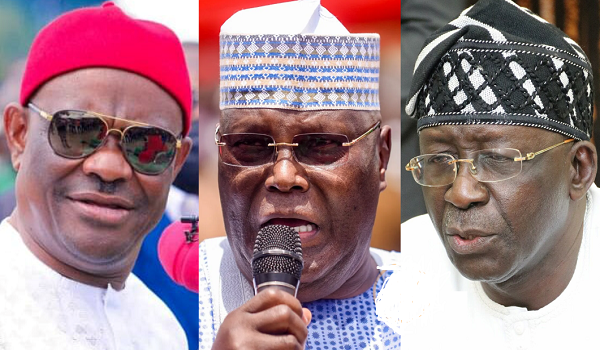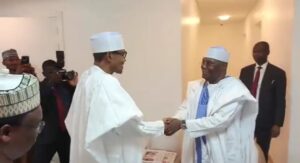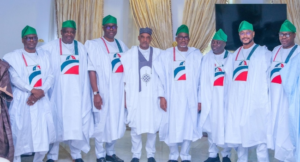
Moves to resolve the leadership crisis rocking the Peoples’ Democratic Party (PDP) have failed to yield results. The crisis has its roots in the rift between the presidential candidate, Atiku Abubakar, and Rivers State Governor Nyesom Wike. GBADE OGUNWALE traces the genesis of the face-off and chronicles Atiku’s long chase after the PDP ticket.
The loss of the 2015 presidential election triggered leadership turmoil in the Peoples’ Democratic Party (PDP). The then National Chairman, Adamu Mu’azu could not stand the heat. He resigned in May 2015. Earlier, Mu’azu’s predecessor, Alhaji Bamanga Tukur, who was elected in December 2012, had been forced to resign in January 2014.
The PDP chairmanship seat was zoned to the Northeast at the time. Tukur hailed from Adamawa while Mu’azu emerged from Bauchi, both in the same Northeast. In January 2016, Ahmed Gulak (now late) stormed the PDP national secretariat in a commando style. Gulak, from Adamawa, declared himself National Chairman. He had insisted on completing the four-year tenure for the Northeast, which was left uncompleted by Tukur and Mu’azu.The Gulak invasion jerked the otherwise complacent PDP Governors into action. The search for Mu’azu’s replacement commenced in earnest with the Rivers State’s Governor Nyesom Wike leading the charge.
There were three leading aspirants in the race for chairman, all from the Northeast. They were Mohammed Abba Gana (Borno), Shehu Musa Gabam (Bauchi) and Wilberforce Juta (now late) from Adamawa. Tagging at Wike’s cloak was Ayo Fayose who was then governor of Ekiti State. Of the three aspirants, Gabam, who was the youngest, was said to be the favourite choice of the governors. However, in the course of screening the aspirants, the news filtered in that Wike and Fayose had resolved to settle for a former Borno State Governor, Ali Modu Sheriff as National Chairman.
Many stakeholders, including inquisitive reporters, had dismissed the report as “fake news” because Sheriff was not an aspirant in the race in the first place. Besides, Sheriff was governor in Borno from 2003 to 2011, on the platform of the now defunct All Nigeria Peoples Party (ANPP). There had never been any media report about him joining the PDP prior to the screening.
The Wike-Fayose tag team eventually announced Sheriff as their choice candidate for the job. This drew the ire of PDP stakeholders nationwide, including the leadership of the Board of Trustees (BoT). Many of them had warned that Sheriff could not be trusted with such a sensitive office.
The BoT leadership had described him as “not a fit and proper person” for the position of national chairman. Wike and Fayose had their way nevertheless. They made Sheriff Acting Chairman in February 2016. He was to serve until December 2016 after a substantive chairman would have been elected. However, Sheriff later turned out to be PDP’s nemesis. A convention was fixed for August 17, 2016, in Port Harcourt, Rivers State where Sheriff’s appointment would have been ratified. In protest, a section of PDP elders, led by Prof Jerry Gana, had fixed another date for a parallel convention in Abuja.
A few hours before the scheduled Port Harcourt convention, the Wike-Fayose camp received privileged information that Sheriff had started scheming for the PDP presidential ticket ahead of the 2019 elections. Without revealing his plans, he was said to have promised five of the PDP southern governors the 2019 vice presidential ticket. The governors were, however, able to abort Sheriff’s plans at the last minute.
A rattled Sheriff had, in his capacity as Acting Chairman, called off the convention. It was too late as the governors declared Sheriff sacked. The PDP got split into two factions. A former Kaduna State Governor, Ahmed Makarfi, was appointed as Caretaker Chairman by the Wike/Fayose camp while Sheriff held on to a renegade faction.
A protracted legal battle ensued as the Sheriff faction battled the Makarfi Caretaker Committee for recognition. The Supreme Court finally sacked Sheriff as PDP chairman in July 2017. Wike got the credit for saving the PDP from Sheriff’s atrocious grip. But it’s not lost on stakeholders that Sheriff was a creation of the Rivers Governor. It took a definitive judgement of the apex court to cage the Frankenstein monster. With Sheriff out of the way, Wike became the de facto PDP “national leader”.
From that point, the process of choosing the national chairman got subjected to the dictate of his whims. In late 2017, stakeholders decided to pick the national chairman from the Southwest. Wike tried to sell the candidature of a veteran Lagos PDP governorship candidate, Jimi Agbaje. It did not fly because party elders like Chief Bode George, Prof Tunde Adeniran and Prof Taoheed Adedoja were also in the race. At the last minute, Wike unilaterally zoned the position to the South-south. He anointed his fellow Rivers man, Uche Secondus who he succeeded in installing as national chairman in December 2017. But there was a disagreement between him and Secondus along the line and Wike instigated Secondus’ removal in August 2021, some four months to the end of his four-year tenure.
After Secondus’ unceremonious exit, stakeholders again agreed to pick a new chairman from the Southwest. Chieftains like former Osun State Governor, Olagunsoye Oyinlola and a few others from the zone had joined the race. But Wike, again, had a brain wave that changed the entire plan.
The Rivers Governor then mobilised other PDP governors to settle for a candidate from the North Central, instead of the Southwest. Wike had assigned the Benue State Governor, Samuel Ortom the role of getting a suitable candidate for the job. The name of a former Senate President, David Mark, came up during consultations and there were strong indications that Mark was a favourite for the job.
The plan, however, suddenly changed at the last minute. Ortom, leading other PDP leaders in the North Central, “unanimously” agreed to pick Dr. Iyorchia Ayu. Mark is of minority Idoma in Benue while Ortom and Ayu are of the majority Tiv stock. And by October 30, 2021, Ayu emerged as PDP National Chairman through a consensus arrangement. Other members of the National Working Committee (NWC) were also elected through consensus at a national convention that was heavily policed by the PDP governors.
Meanwhile, Ayu, who was brought in by the Wike/Ortom camp, switched loyalty to the Atiku camp the moment he assumed office. Atiku and Ayu are known to have built and nurtured personal friendships and political ties over the years. They had cut their political teeth in the Peoples From (PF) in the early 1980s, under the tutelage of the late Army General and political tactician, Shehu Musa Yar’ Adua.
The PF later morphed into the Peoples’ Democratic Movement (PDM) a feeder political group formed by the late ex-soldier cum politician, with Atiku, Ayu and others as foot soldiers. With Ayu as National Chairman, Atiku was able to scale the hurdles to clinch the PDP ticket on May 29, 2022, presidential primary election presided over by his friend. Wike, who also contested for the ticket, came second in the race. With the PDP ticket in his pocket and his friend as National Chairman, Atiku decided to go for the whip.
A few days after the presidential primary, Atiku had, apparently tongue in cheek, offered Wike the vice presidential ticket during a visit to the Rivers Governor’s Abuja residence. A few of Wike’s associates who were at the meeting attested to the fact that Atiku actually made the offer. But, a few days after, the PDP candidate announced the Delta State Governor, Ifeanyi Okowa as his running mate. That was the first lash of the whip on Wike’s bareback. Smarting from the impact of the whipping, Wike demanded the resignation of Ayu as chairman. He had insisted that there was a need to address the North/South dichotomy in the leadership structure of the party. This, he also claimed, was for Ayu to fulfil the promise he made before he was elected chairman; that he would resign if the PDP presidential candidate emerged from the North.
But, with the backing of Atiku and his loyalists, Ayu has continued to clutch at Section 42 (2) of the PDP constitution. The Section makes it mandatory that if a chairman should resign before the end of his tenure, his seat must be taken by one of the Deputy National Chairmen from his region. In this case, the Deputy National Chairman (North) who is eligible to take Ayu’s seat, is Umar Damagum from Yobe State, Northeast Nigeria.
To call Wike’s bluff, Atiku rallied the PDP National Executive Committee (NEC) to rescue Ayu. And at a meeting on September 9, the NEC passed a vote of confidence in Ayu. Venting his frustration, the Rivers Governor has resorted to launching a sustained campaign for Ayu’s removal.
A dozen committees and delegations raised to broker a truce between the Rivers governor and the presidential candidate have achieved very little. Rallying four other PDP governors in the battle, Wike has sustained verbal attacks on Atiku and Ayu.
The campaigns have taken prime time on many privately owned television stations with national coverage. His messages have been poignant, usually delivered with sufficient doses of invectives, theatrics and name-calling.
Wike and the four PDP governors have vowed never to campaign for Atiku if Ayu is retained as chairman. But Atiku and the PDP have moved on.
The PDP presidential campaign council had since been inaugurated in Abuja on September 28. It was followed by the flag off of the presidential campaign in Uyo, the Akwa Ibom State capital on October 10. Atiku held his campaign rallies in Kaduna and Borno a few days ago and the campaign train is expected to move to the next destination in the coming days.
The Atiku/Wike rift is a fallout of scheming by the two politicians chasing after the PDP presidential ticket. With an eye on the ticket, Wike had ensured that the PDP chairman did not emerge from any part of the South.
On the other hand, the emergence of Ayu as chairman was a major win for Atiku. Ayu did not need any persuasion to tilt the balance in favour of his friend and political associate of several decades. It’s widely believed that as PDP chairman, Ayu was privy to the horse-trading that saw the Sokoto State Governor, Aminu Tambuwal stepping down for Atiku during the presidential primaries.
A few hours after Atiku had won the ticket, Ayu, during what appeared a “thank you” visit, had declared Tambuwal as the “hero of the convention”. And in the spirit of friendship, Atiku, in turn, has stood by Ayu in weathering the storm.
The chances of reconciling Wike with Atiku are growing slimmer by the day. Having been outsmarted, Wike has continued to make political moves that are overtly antagonistic to Atiku and his presidential project. On the other hand, Atiku has chosen to fight the battle covertly. He has made a number of subtle moves aimed at neutralising the influence of the Rivers Governor in a number of states.
It paints a battle-to-the-finish scenario – a classic case of “he that is down needs fear no fall”. Wike is busy digging the grave for PDP at the national level. The Governor has consistently maintained that it’s an act of betrayal to reward Atiku with the ticket. Atiku had in the past, dumped the party and teamed up with others to work against the PDP, causing the party to lose the 2015 presidential election. On the other hand, Atiku and his coterie of loyalists may as well be preparing the ground for the obsequies.
The rift between Atiku Abubakar and Wike did not start with the winning and losing of the party’s October 2021 presidential primary election. It had its roots in Atiku’s endless chase after presidential tickets of political parties he considered viable enough. In 2011, Atiku lost the PDP ticket to incumbent President Goodluck Jonathan.
Jonathan at the time received tremendous support from key party stakeholders across the six geopolitical zones. As the vice president, fate had thrown the presidency upon his shoulders in May 2010. His boss, President Umaru Yar ‘Adua, had died in office. It was yet another stroke in the Otuoke-born politician’s streak of fortune by happenstance. He was a Deputy Governor in his native Bayelsa State. His erstwhile boss, Diepreye Alamieyeseigha, who was then Governor, got entangled in corruption-related issues that eventually consumed him in 2005. Jonathan mounted the saddle as governor following Alamieyeseigha’s fall. He had perfected plans to run his own election as Bayelsa governor in 2007.
However, the then incumbent President Olusegun Obasanjo drafted him (willy-nilly?) into the national political arena. A presumptuous Obasanjo, had, in the twilight of his eight-year presidency, imposed Yar’ Adua as PDP’s presidential candidate for the 2007 election.
Obasanjo had gone ahead to pick an unimpressive Jonathan as running mate to the visibly ailing Yar’ Adua. By every trick, foul and vile, Obasanjo saw to it that the election became a “walkover” for the PDP candidate. As was publicly attested to by the late Yar’ Adua himself, the 2007 presidential election was an exercise in electoral brigandage. Apparently to demonstrate some sense of equity and fairness, the majority of PDP power brokers in the North, in 2011, allowed Jonathan to run with the PDP presidential ticket unchallenged. This was a sequel to an unwritten mutual understanding that Jonathan would not contest again in 2015. Based on this understanding, Atiku, who contested the 2011 ticket with Jonathan, suffered a humiliating defeat at the presidential primary.
Jonathan won the ticket and also went ahead to win the 2011 presidential election. However, Jonathan breached the unwritten one-tenure code as he, against all odds, appropriated the 2015 PDP presidential ticket to himself. He saw to it that the PDP leadership at the time, printed only one set of presidential expressions of interest and nomination forms. And Atiku, having read the handwriting on the wall well ahead of time, had defected to the All Progressives Congress (APC).
However, his bid for the APC’s 2015 presidential ticket was checkmated by some powerful forces he met on the ground at the then-rampaging opposition party. He lost the ticket to Muhammadu Buhari who eventually won the 2015 presidential election. Again, he read the bold handwriting on the wall during Buhari’s first tenure and scurried back to the PDP in 2017 to resume the chase for the presidential ticket. He eventually got the 2019 PDP ticket but lost the election to Buhari and his APC.
Atiku, again, is running with the PDP ticket in the 2023 election. The old political horse will turn 76 on November 25. The Wazirin Adamawa may as well be making his final attempt at the presidency. Perhaps.








